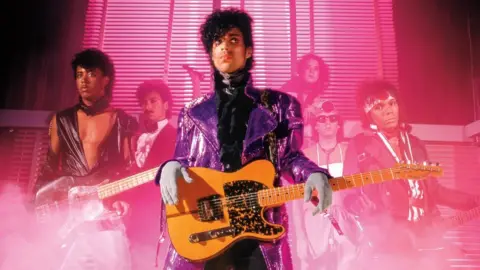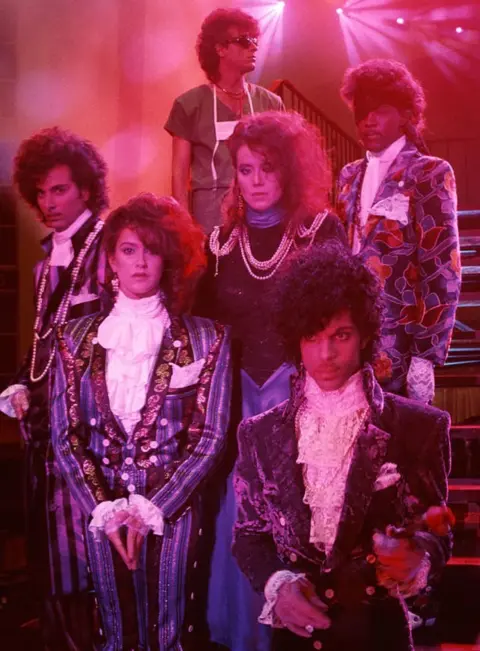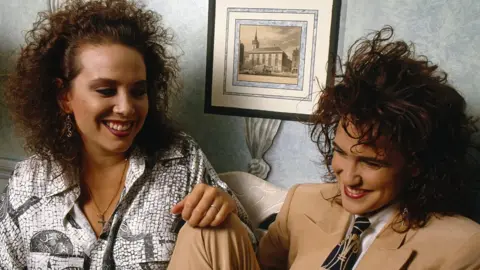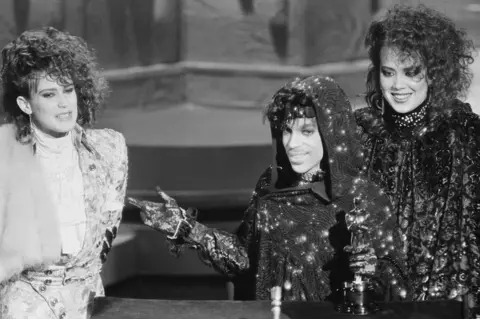The real story behind Prince's Little Red Corvette
 Allen Beaulieu
Allen BeaulieuLittle Red Corvette is the song that made Prince a star - a breathless ode to casual sex that gave him his first US top 10 hit in 1983 and introduced him to the mainstream.
The story goes that Prince came up with the opening lines - "I guess I should have known, by the way you parked your car sideways, that it wouldn't last" - after falling asleep in the back of a car owned by his keyboard player Lisa Coleman.
And that's true... to an extent.
The BBC got the full story behind the song, and some of Prince's other hits, directly from Coleman and her musical partner in crime, Wendy Melvoin.
They were perhaps Prince's most important musical collaborators, working solidly with him throughout the early '80s as members of The Revolution, introducing elements of jazz and classical to his provocative blend of funk and rock.
After he dismissed the band in 1986, Wendy and Lisa released several successful albums as a duo and went on to score hit TV shows like Nurse Jackie and Heroes. They're currently working on an album with comedian Maya Rudolph and celebrating Prince's legacy by reforming the original line-up of The Revolution.
The duo reminisced about their favourite Revolution songs ahead of the release of a deluxe edition of Prince's fifth studio album, 1999, this Friday, containing 35 previously unreleased songs.

LITTLE RED CORVETTE
Allow Google YouTube content?

Lisa: "Prince was always borrowing my car because it was awesome. It was a '64 Mercury Montclair, pink and white, and it was just the perfect cruise-mobile on a beautiful day in Minneapolis. He actually put a couple of dents in it, because it was so big. He'd come up to me and mumble, 'Hey Lisa, sorry about your car'. So I'd run out to inspect the damage and there'd be a little dent with some yellow paint from a pole he'd reversed into, and I'd go, 'Damn it. Watch where you're going!'"
Is it true he wrote Little Red Corvette while he was sleeping in the back of the car?
"Well... I guess. He was 'sleeping' with someone we knew called Denise Matthews [aka Vanity] and she was 'sleeping' in the back of the car, too. I even found some of her hair wrapped around the handle that winds the window down.
"So I imagine they were making out, or doing whatever, in the back seat and they probably had a wonderful moment of afterglow, which is when he got the seed of the idea... But it's not a red Corvette, it's a pink Mercury!"
The song became his mainstream breakthrough. Did you know it was special?
"Yeah, definitely. It was pure hit material and Prince coveted it for a little while.
"Before it was recorded, we'd play it in sound check and our manager Steve [Fargnoli] would freak out. Prince used to laugh at him: 'Oh, Steve has babies when we play this song!'"

1999
Allow Google YouTube content?

Lisa: "I have a really clear memory of the first time I heard that song. I'd gone to rehearsal early, but Prince was already there playing the main keyboard riff. He motioned me to come over, and said, 'Play this', then he went down and picked up the guitar and started fooling around with it. Then, when everybody else started showing up, he showed them their parts and we all kind of fell in.
"I was in good favour that day, because I decided to hold down D and F in the chorus. He was like, 'Alright, that's great! Listen to Lisa, she's producing herself. Why don't the rest of you guys do that?' He was always nice and then he'd have to say something mean after. Like, 'I can support you but don't forget you're not all that.'"
You get to sing the first line of the song. How did that come about?
"Prince got the idea of splitting the vocals up from Sly & The Family Stone, and how everyone had a presence in that band. We actually added Jill Jones's voice because she's a better singer than I am. So it's the two of us singing together. I have the dreamy quality and she has the fire."

D.M.S.R.
Allow Google YouTube content?

Lisa: "I still love playing that song. I love the funk and the Minneapolis sound of it, with the Oberheim [synthesizers] and everything. It has a party vibe going all the way through."
The groove on that song is so persistent. You must play the main riff a couple of hundred times.
"Right, exactly. It's almost meditative. That was one of the great things about being in the Revolution. We were like whirling dervishes, because we would take a groove and play it for hours on end. It was not only good for training our bodies - but imagine what that did to our brains. There were times in these jams and rehearsals where I'd really feel elated. It was so good. You just become part of the music, there's no other way to explain it."
The lyrics are all about personal liberation and celebrating your sexuality, which was quite unusual in 1982.
"It was definitely out of phase. I was always proud of him because it wasn't in fashion to talk about those things back then. He had a vision about people, about how we could be together, and he managed to create an oasis in Paisley Park for people who heard the message."

 Warner Music
Warner Music
AMERICA
Allow Google YouTube content?

Guitarist Wendy Melvoin joined the Revolution in 1983, playing her first gig on the night Prince debuted Purple Rain.
Lisa told the BBC about the creation of that song in a previous interview, so we skipped ahead to 1985, and the release of Prince's seventh album, Around The World In A Day. The record, which featured the hits Pop Life and Raspberry Beret, also contained a funk jam called America, which served as the ultimate showcase of The Revolution's musical muscle, especially on the unedited 21-minute version that appeared on the 12" single.

Lisa: "The first time we played America was in a tent in the south of France, while we were filming Under The Cherry Moon."
Wendy: "There was no ventilation and it was over 100 degrees in the tent. And if you've watched the video, you can see we are full-on running around the stage. I remember both Prince and I had to have oxygen tanks brought to us because we almost passed out from heat exhaustion."
Lisa: "I remember Prince laying down on a road case and somebody brought him some orange juice. I mean, he was just dripping with sweat."
Wendy: "He was wearing a trench coat!"
 Rex Features
Rex FeaturesPrince is essentially conducting the band during that song, calling out changes on the fly, and even jumping on the drums at one point. How do you rehearse for something like that?
Wendy: "It's not an easy answer. We were good listeners, and we had worked on the groove for quite some time, so we knew what was expected of us. It was all basically just, 'Keep your eye on him', and he'd give us signals on where he wanted to go."
Lisa: "Sometimes he'd come up to my keyboards and jam a little bit and say, 'Play something like that'. But in this case, he just gave me the lead line, so I have the most boring part!"
Wendy: "Really? Is that line all you do?"
Lisa: "Well, I sing my ass off."
Wendy: "I'm busy up there. The guitar part's very intricate."
Lisa: "Sometimes, when I got really easy parts I'd get mad at Prince and play with a yo-yo on stage, going, 'I'm bored!'"

SOMETIMES IT SNOWS IN APRIL
Allow Google YouTube content?

Sometimes It Snows in April is the final track on Prince's second film, Under the Cherry Moon. It's an uncharacteristically spare and melancholy addition to the star's songbook, and deals with the passing of a beloved friend. After Prince died in April 2016, the song became his eulogy, and The Revolution regularly revisit it in concert.

Wendy: "We were at Sunset Sound in Los Angeles, Prince, me and Lisa, just the three of us, and we were all in quiet moods. I picked up an acoustic and Lisa was playing piano and we just started coming up with a motif, a progression. Prince is very quick with words, so it kind of just happened in a couple of hours. He'd written the whole lyric and sung the whole song. It came very fast."
Lisa: "He pushed for that dissonant chord when he sings 'Sometimes I wish'. He called it the 'Lisa chord' but it was actually his harmony that made it dissonant. It's beautiful the way it resolves."
Wendy: "It was a nice night. I remember being very, very calm. There was no drama of any kind."
 Getty Images
Getty ImagesThere's a real fragility to that song.
Wendy: "There were a few around that time. Power Fantastic had a lot of tenderness, and so did The Tears In Your Eyes. They all had that same kind of gentle quietness."
Tell me more about the 'Lisa chord'.
Wendy: "I'll tell you one thing about Lisa: All of the musicians that Prince hired over the years, including me, he can do all of their parts. The only musician he ever hired that he can't mimic was Lisa. She became invaluable to him and I believe, truly, that Lisa was his ultimate musical muse. I've always felt that way and I stick to my guns on that one."
Lisa: "Wow."

ALL MY DREAMS
Allow Google YouTube content?

Prince was recording several potential albums, including the triple-disc Crystal Ball, when he suddenly called time on The Revolution. Bootlegs from those sessions have circulated amongst fans for years, and this All My Dreams is Wendy & Lisa's personal favourite.

Wendy: "I wish Lisa and I could get our hands on All My Dreams and finish it up for him."
Lisa: "That was such an interesting, fun, crazy day in the studio. When you listen to it, it's like a little movie or something. It had a carnival atmosphere."
Wendy: "Do you remember around that time we took him to see Kid Creole and the Coconuts and he fell in love with August Darnell singing through the megaphone? He made [studio engineer] Susan Rogers buy him one for that song."
Lisa: "It's so full of imagination. He sings, 'Lisa, I'm going to give you the paintbrush and you're going to paint the side of the train'. What does that mean?! And then I do some crazy piano solo, just pounding around, and we were just like, "Y'arr! This is great! This is just fantastic!'"
Wendy: "I remember me and Lisa and my twin sister Susanna pulled out recorders we had from our school days, and Prince was like, 'Bring it on!' It was just a crazy time."
You're in a reverie remembering it.
Wendy: "Oh yeah, for sure. It was such a beautiful time of exploration."
Lisa: "Sometimes the work was just work. But this? It was like kindergarten for songwriters. As musicians, as songwriters, we were a little bit nuts."
Why did Prince withdraw from that psychedelic style?
Wendy: "Because we were gone. And once we were gone, he turned into a different person. That's the nature of who he was."
Lisa: "Prince always wanted to be great, so he needed to regroup and think, 'How do I reach the next level of my greatness? Is it a movie? Is it a different band?' He didn't know, but he had to find out - so it was like, 'Sorry, you guys. Too bad. See ya.'"
The deluxe edition of 1999 is released on Friday. Lisa Coleman's solo piano album, Collage, is out now.

Follow us on Facebook, or on Twitter @BBCNewsEnts. If you have a story suggestion email [email protected].
